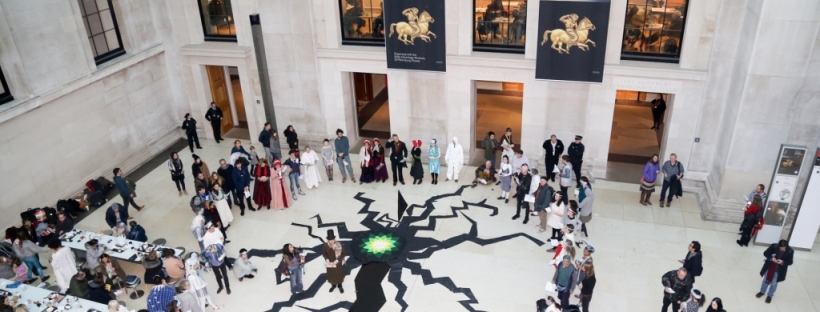On Monday night, we guest hosted #MuseumHour, a weekly Twitter discussion for the museums sector ‘to ask the unsayable and think the unthinkable’.
Taking our lead from Arts Professional’s recent survey on ethical sponsorship, we asked a series of related questions, including several suggested by one of AP’s editors. The heated and lively debate included contributions from curators, consultants, front of house staff, researchers and activists, often with side-threads of discussion popping up. Some participants even picked up conversations the following morning!
Over the course of the discussion, many agreed that:
- Acting ethically on sponsorship is the best way to reduce related reputational risks
- Ethical fundraising policies are a good thing and should be standard practice
- All stakeholders, from directors to front of house staff, should be involved in developing a policy, and the public should be able to engage in the conversation
- Larger museums with ‘unethical’ partnerships are often under less financial pressure than those smaller museums that demonstrate ethical best practice
While we can’t do justice to the breadth and richness of the whole debate, here is a tweet-filled run-down of how the discussion unfolded.
From the very start, we were into thought-provoking ethical questions…
Arts Fundraising & Philanthropy approached the question from another angle…
Some questioned what other types of “risk” should be taken into consideration…
For some contributors, the obligation on museums to act ethically around sponsorship was clear cut, both in relation to respecting so-called ‘source communities’…
https://twitter.com/jetpack/status/991033804352565248…and for others, there is an obligation to act ethically because many museums and cultural organisations are also recipients of public money. While state funding may need ‘topping up’ from other sources, poorly-chosen partnerships could undermine the potential good that had initially been supported by other funders, both public and private.
Question 2 led to some thoughtful interrogation of the museum’s role in society…
Arts, research and activism organisation Platform highlighted that the partnerships a museum or gallery chooses intersect directly with questions around the diversity of visitors and audiences…
And while it’s generally accepted that curators and artists must retain their independence, an interesting thread emerged about those partnerships which go beyond the purely financial…
For some, there were clear ethical ‘red lines’ that could, and may already, have been drawn…
Question 3 picked up on one of the most significant stats from Art’s Professional survey and led the discussion into the nitty-gritty of how museums should exercise ethical judgment on sponsorship…
One thread of the discussion started exploring what should be included within an Ethical Fundraising Policy and who should be consulted…
Question 4 picked up the issue of funding cuts and pressures on museum budgets. It cited a follow-up article to Arts Professional’s ethical sponsorship survey which had the headline ‘Arts sector fears being too poor to refuse “unethical” donations’.
There was some general agreement that often those signing up to ‘unethical’ sponsorship deals were those under less significant financial pressure…
Importantly, this highlighted that there needed to be greater support for development teams in order to pursue more positive alternatives…
Question 4 also drew out the stark reality that underlies some sponsorship deals…
However, some highlighted that private and public funding can, at times, both help and hinder…
https://twitter.com/Joshua_Speer/status/991072056736350208
https://twitter.com/jetpack/status/991073145724571650 https://twitter.com/jetpack/status/991074338760790016The importance of having good governance – and representative boards of trustees – was also raised…
https://twitter.com/jetpack/status/991700536092217345Question 5 dug into the issues around turning down a sponsorship deal, and there were some incisive responses from those actively working in museums…
Some also saw the benefit of bringing any controversy out into the open and making decisions around sponsorship – including turning a deal down – part of the conversation…
Question 6 confronted one of the common retorts that is made when questions are raised in the media about unethical sponsors…
Some saw the potential benefits of seeing different areas of financial and operational activity as interconnected, and noting that both have ethical dimensions…
Similarly, some recognised that taking an ethical approach to sponsorship can be symbolically powerful…
There have been cases in the past – such as Shell’s sponsorship of the Science Museum – that raised the question of whether sponsorship deals can have a ‘chilling effect’ and create pressures to self-censor. Question 7 picked up this thorny issue…
Question 8 took its lead from the Museums Association’s Code of Ethics, which brought the discussion back to more practical questions of policy, process and governance…
Some noted that, where policies aren’t being enforced and best practice isn’t happening, other methods of accountability become valuable and, sometimes, essential…
By now, there was general agreement that Ethical Funding Policies were good practice. Question 9 asked who should be involved in developing them and, more broadly, who should make decisions about who to partner with?
Some noted that, while there may be risks involved, opening up the conversation and being more transparent about decision-making on sponsorship was generally a good thing…
Question 10 took a step back from the decisions of individual museums and cultural organisations, and looked at the bigger picture…
Given the consensus around the value of ethical fundraising policies, some asked whether sector-wide bodies could be more specific about what they expect of their members and grantees…
Some rightly highlighted that we should recognise that sponsors aren’t always companies…
As ever, with such a heated and lively discussion, there was only a limited amount of time left for the final question…
Culture Unstained has already begun gathering some examples of best practice over on our ethical sponsorship pages. We’re keen to add more and you can add your suggestions here.
We recommend taking a look at the #MuseumHour hashtag and some of the side conversations that emerged during Monday’s discussion.
Thank you to the #MuseumHour team for inviting us to host, and also to the editors of Arts Professional for your questions and for providing an important source of material for this debate.
